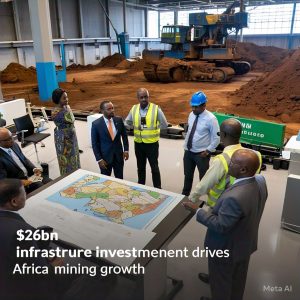Bamidele Famoofo
About $26billion injected into the mining sector by Africa and its global partners are accelerating investments in regional corridors, prioritizing port, road and rail infrastructure to enhance mining operations.
As logistics infrastructure takes centre stage, key projects and regional corridor developments offer prime investment opportunities for global logistics and mining stakeholders.
In February 2025, the Winning Consortium Simandou awarded a $248 million contract to U.S. engineering firm Wabtec for locomotives supporting the Trans-Guinean Railway project. This railway will transport minerals from Guinea’s Simandou Iron Ore Project – the world’s second-largest untapped iron ore deposit. The project is expected to facilitate the extraction of 1.8 billion tons of iron ore, significantly boosting Guinea’s export revenue.
Similarly, Angola is set to begin construction of a 260km section of the Benguela Railway in 2025 as part of the Lobito Corridor initiative. In September 2024, the International Finance Corporation signed concession agreements with Zambia and Angola to finance, construct, own and operate an 800-km railway section of the corridor, linking the two nations. Once completed, the $10 billion Lobito Corridor will streamline mineral exports from Zambia, the Democratic Republic of the Congo and Angola to international markets.
The $15.6 billion Lagos-Abidjan Highway, slated for construction in 2026, will connect Nigeria, Benin, Togo, Ghana and the Ivory Coast, facilitating regional trade and mining exports. Funded by the African Development Bank (AfDB), the European Union and the ECOWAS Commission, the 1,028-km project is expected to generate 70,000 jobs and enhance economic integration. AfDB President Akinwumi Adesina emphasized its significance: “It’s only through regional corridors that we can move goods and services easily across the continent, lower transport costs, promote integration and achieve impactful economic development.”
In September 2024, Tanzania, Zambia and China signed an agreement to modernize and expand the Tanzania-Zambia Railway (TAZARA). The upgrade will optimize the transport of minerals such as copper from Zambia, as well as uranium and rare earths from Tanzania, improving access to international markets via the Port of Dar es Salaam. With Zambia targeting an annual copper production of 3 million tons by 2031, the revitalized railway will strengthen export capabilities and attract global buyers to the Zambian Copperbelt region.
The African mining week has disclosed that it will bring together African mining projects and international investors under one roof, facilitating strategic partnerships that optimize mineral logistics and drive industry growth. “As infrastructure investments accelerate across regional corridors, the event provides a vital platform to explore emerging opportunities in rail, port and road development. With major projects reshaping Africa’s mining supply chains; AMW offers key insights into the future of mineral transportation and trade,” it added.









